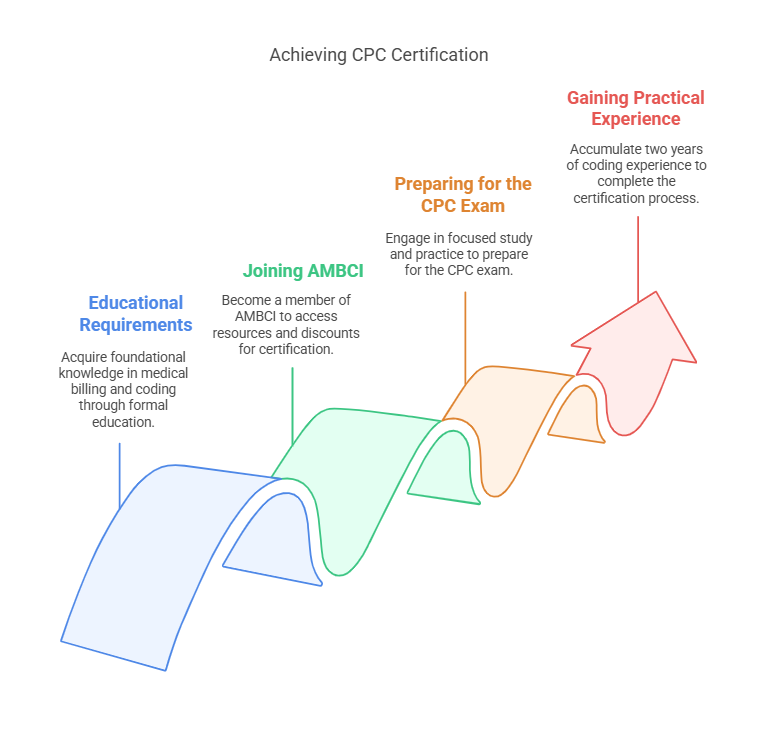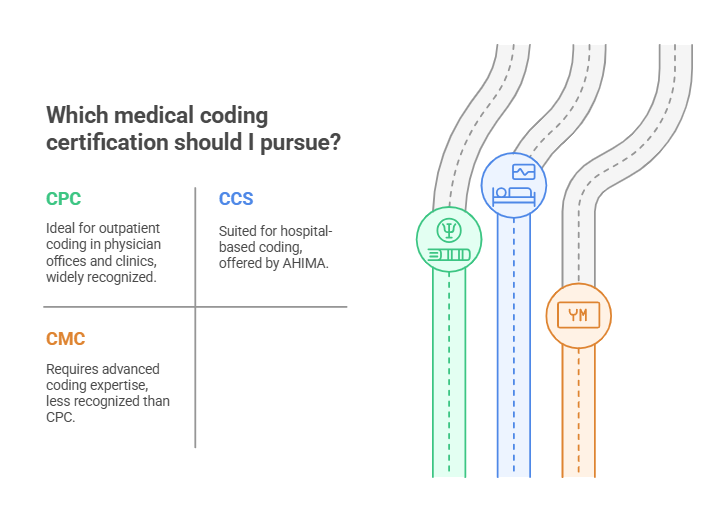What is CPC Certification and Why It Matters in Medical Coding
CPC certification, or Certified Professional Coder certification, is a widely recognized credential in the medical coding field. It validates a coder’s expertise in outpatient medical coding, ensuring accuracy in billing and compliance with industry regulations. Obtaining this certification enhances career opportunities, increases earning potential, and provides professional recognition in the healthcare industry.

Certified Professional Coders (CPCs) are highly regarded by employers due to their ability to translate medical records into standardized codes essential for insurance claims and reimbursement. Medical billing and coding certification is a critical component of this profession. The certification process, offered by AMBCI, requires candidates to complete specific educational requirements, gain practical experience, and pass a rigorous examination.
Understanding CPC Certification
The CPC certification is the leading credential in medical coding, known for its stringent criteria and comprehensive assessment of coding proficiency. Securing this certification demonstrates a coder’s ability to accurately convert medical documentation into codes required for billing and regulatory compliance.
To earn CPC certification, candidates must have a solid foundation in anatomy, physiology, and medical terminology. They must also be well-versed in various coding systems, including CPT, HCPCS Level II, and ICD-10-CM. These skills enable coders to work efficiently in physician offices, outpatient facilities, and other healthcare settings.
Role of a Certified Professional Coder
Certified Professional Coders play a crucial role in the healthcare system. They ensure accurate medical coding for services provided by healthcare professionals, facilitating smooth billing and reimbursement processes. By assigning the correct codes, CPCs help streamline insurance claims and maintain compliance with industry regulations.
CPCs must be proficient in medical coding guidelines and various clinical scenarios. Their expertise is essential for ensuring that healthcare providers receive proper compensation for their services. Additionally, they contribute to accurate patient records, which are critical for continuity of care.
Benefits of CPC Certification
Enhanced Career Opportunities
Obtaining CPC certification significantly improves job prospects in the healthcare industry. Employers prioritize certified coders due to their proven expertise and commitment to maintaining high standards in medical coding. CPCs have an advantage in securing roles in hospitals, clinics, and private practices, often leading to better job stability and career growth.
Higher Earning Potential
Certified coders earn significantly more than their non-certified counterparts. As of 2025, CPCs earn an average salary of approximately $62,000 per year, with experienced professionals and those holding additional certifications earning over $85,000 annually. Specializations in medical coding, such as risk adjustment or auditing, can further boost earning potential.
Professional Recognition
CPC certification is recognized nationwide and enhances a coder’s professional reputation. It demonstrates their expertise in the field and instills confidence in employers and clients. Certified coders are more likely to be considered for leadership roles, promotions, and specialized positions within healthcare organizations.

Steps to Obtain CPC Certification
Educational Requirements
To qualify for CPC certification, candidates should have a background in medical billing and coding, preferably with a diploma or degree. It is essential to be well-versed in medical terminology, anatomy, and pathophysiology. Many professionals complete an Undergraduate Certificate in Medical Billing and Coding, which provides a comprehensive understanding of key concepts.
Joining AMBCI
Becoming a member of the (AMBCI) is a crucial step toward obtaining CPC certification. AMBCI membership provides access to valuable resources, including study materials, webinars, job search tools, and networking opportunities. Members also receive discounts on certification exams and continuing education courses.
Preparing for the CPC Exam
The CPC exam is a challenging assessment consisting of 100 multiple-choice questions that must be completed within four hours. Since it is an open-book exam, candidates can use coding manuals, but they must be proficient in finding and applying codes quickly.
To prepare for the exam, candidates should:
Enroll in AAPC-approved training programs
Take practice exams that simulate real test conditions
Develop a structured study plan covering all exam topics
Gaining Practical Experience
Candidates must complete two years of medical coding experience to remove the CPC-A (Apprentice) designation from their certification. This experience can be gained through employment in healthcare facilities, internships, or coding courses that include hands-on training.

Maintaining CPC Certification
To retain CPC certification, coders must complete 36 hours of continuing education units (CEUs) every two years. CEUs can be earned through workshops, online courses, and industry conferences. Additionally, certified coders must renew their membership with AAPC and pay recertification fees.
Comparing CPC with Other Medical Coding Certifications
CPC vs. CCS
The Certified Coding Specialist (CCS) certification, offered by AHIMA, is designed for coders working in hospital settings. In contrast, the CPC certification is focused on outpatient coding, making it ideal for physician offices and clinics.
CPC vs. CMC
The Certified Medical Coder (CMC) certification is gaining popularity among advanced medical coders. While CMC certification requires more in-depth coding expertise, it lacks the widespread recognition of CPC certification. CPC remains the gold standard for outpatient coding.
Choosing the Right Certification
Selecting the appropriate certification depends on career goals and preferred work settings. CPC certification is best for those working in physician offices, outpatient facilities, and specialty clinics, while CCS is suited for hospital-based coders.

Less-Known Facts About CPC Certification
CPC certification is recognized internationally: Many countries accept CPC credentials, making it valuable for professionals seeking global career opportunities.
Coders with CPC certification reduce claim denials: Proper coding prevents insurance claim rejections, leading to faster payments for healthcare providers.
AI and automation are transforming medical coding: While AI assists in coding, certified coders are still needed to ensure accuracy and compliance.
CPC-certified professionals can work remotely: Many healthcare organizations offer remote coding jobs, providing flexibility and work-life balance.
CPC certification can lead to specialized roles: Certified coders can advance to positions like compliance auditor, risk adjustment coder, or coding manager.
Employers often reimburse CPC certification costs: Some healthcare companies cover exam fees and training expenses for employees pursuing certification.
Career Paths for CPC-Certified Professionals
CPC certification opens doors to various career opportunities, including:
Medical Records Technician – Managing patient records and ensuring compliance with regulations
Coding Auditor – Reviewing medical coding accuracy to prevent errors and fraud
Reimbursement Specialist – Assisting with insurance claim processing and payment approvals
Patient Access Manager – Overseeing patient registration and insurance verification
Certified coders can work in hospitals, outpatient clinics, and specialized healthcare facilities, with options to advance into leadership roles.
Frequently Asked Questions (FAQs)
-
Candidates should have a diploma or degree in medical billing and coding, with a strong understanding of medical terminology, anatomy, and coding systems.
-
As of 2025, the CPC exam fee is $425 for AAPC members and $525 for non-members. Membership with AAPC provides additional benefits and discounts.
-
Yes, the CPC exam is available online and in-person. Candidates choosing the online option must follow strict proctoring guidelines.
-
Most candidates take 3-6 months to prepare, depending on their prior experience and study schedule.
-
While not mandatory, CPC certification is highly preferred by employers and increases job opportunities and salary potential.
Conclusion
CPC certification is a valuable credential for medical coders, offering career growth, higher salaries, and professional recognition. By completing the required education, joining AAPC, preparing for the CPC exam, and gaining practical experience, aspiring coders can build a successful career in medical coding. Continuous learning through CEUs ensures that CPC-certified professionals remain up-to-date with industry standards.
